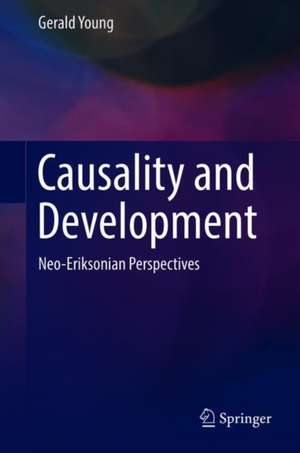Causality and Development: Neo-Eriksonian Perspectives
Autor Gerald Youngen Limba Engleză Hardback – 8 mar 2019
This elegant volume:
- Presents a clear picture of the development of handedness and laterality in more depth than has been attempted in the literature to date.
- Traces the causal concepts of activation-inhibition coordination and networking in the context of development.
- Describes in depth a novel 25-step Neo-Eriksonian lifespan model of development.
- Reviews relevant research on Piagetian and Eriksonian theories in development.
- Emphasizes the clinical utility of the described 25-step Neo-Eriksonian approach to lifespan development.
Preț: 663.45 lei
Preț vechi: 780.54 lei
-15% Nou
Puncte Express: 995
Preț estimativ în valută:
126.97€ • 132.07$ • 104.82£
126.97€ • 132.07$ • 104.82£
Carte tipărită la comandă
Livrare economică 14-28 aprilie
Preluare comenzi: 021 569.72.76
Specificații
ISBN-13: 9783030024925
ISBN-10: 303002492X
Pagini: 572
Ilustrații: XXIII, 608 p. 11 illus.
Dimensiuni: 155 x 235 mm
Greutate: 1.06 kg
Ediția:1st ed. 2019
Editura: Springer International Publishing
Colecția Springer
Locul publicării:Cham, Switzerland
ISBN-10: 303002492X
Pagini: 572
Ilustrații: XXIII, 608 p. 11 illus.
Dimensiuni: 155 x 235 mm
Greutate: 1.06 kg
Ediția:1st ed. 2019
Editura: Springer International Publishing
Colecția Springer
Locul publicării:Cham, Switzerland
Cuprins
Introduction.- Part I: Causality: Development of Evolution of Handedness, Manual Specialization, and Hemispheric Specialization: Activation-Inhibition Coordination Model.- Introducing Laterality.- Developmental Laterality Research: Infancy.- Developmental Laterality Research: Childhood.- Other Human Laterality Research.- Multifactorial Causality in Laterality.- Animal Laterality Research.- Standard Laterality Models.- New Laterality Models.- Part II: Development: A 25-step Neo-Piagetian/Neo-Eriksonian Model: Elaborating the Neo-Eriksonian Model and Therapeutic Practice.- Stage and Sub-Stage Models.- Neo-Models, Neo-Stages, Networks.- Introducing the 25-Step Neo-Eriksonian Model.- The Reflex-Based Sub-Stages: Non-Participatory Reflexive Socio-Emotions.- The Sensori-motor-Based Sub-Stages: Pre-Participatory Socio-Affects.- The Peri-Operational-Based Sub-Stages: Peri-Participatory Social Cognition.- The Abstract (Formal Operational) Sub-Stages: Hyper-Participatory Social Mutuality.- The Post-Formal/Collective Intelligence (Super-ordinate Abstract) Sub-Stages: Super-Ordinate Participatory Collective Sociality.- Book Conclusions.- Appendices.
Notă biografică
Gerald Young, at Glendon, was awarded Fellowship status in both the Association for Psychological Science (APS) and the American Psychological Association (APA). He has received awards from both the American Psychological Association and the Canadian Psychological Association (CPA). Young is Editor-in-Chief of the journal Psychological Injury and Law, which he founded. He also publishes in psychological, psychiatric, medical, and law journals, including a 3-part series on PTSD in Court (2016-2017). In 2017, he published an invited chapter for APA on evidence law. His most recent book is Revising the APA Ethics Code (Springer, 2017). He has appeared as an expert witness for a case involving the Supreme Court of Canada. His practice covers rehabilitation and families.
Textul de pe ultima copertă
The third book in Young’s unique trilogy on causality and development continues to locate and define the central role of causality in biopsychosocial and network/systems development, and as a unifying concept of psychology itself. As a way of discussing causality, in general, initially, the book focuses on the acquisition of handedness and hemispheric specialization in infancy and childhood, and their relations to the development of cognition, language, and emotion, in particular. The second part of the book elaborates an innovative 25-step Neo-Eriksonian model of development across the life course based on a Neo-Piagetian model covered in the previous books, completing a step-by-step account of development over the lifespan cognitively and socio-emotionally. It builds on the concept of neo-stage, which is network-based. From this conceptual synthesis, the author’s robust theory of development and causality identifies potential areas for psychological problems and pathology at each developmental step as well as science-based possibilities for their treatment.
This elegant volume:
This elegant volume:
- Presents a clear picture of the development of handedness and laterality in more depth than has been attempted in the literature to date.
- Traces the causal concepts of activation-inhibition coordination and networking in the context of development.
- Describes in depth a novel 25-step Neo-Eriksonian lifespan model of development.
- Reviews relevant research on Piagetian and Eriksonian theories in development.
- Emphasizes the clinical utility of the described 25-step Neo-Eriksonian approach to lifespan development.
Caracteristici
Integrative approach that aims at the unification of psychology Provides new insights from a neo-Eriksonian perspective Includes biopsychosocial and embodiment theories Allows for more effective validity and testability
